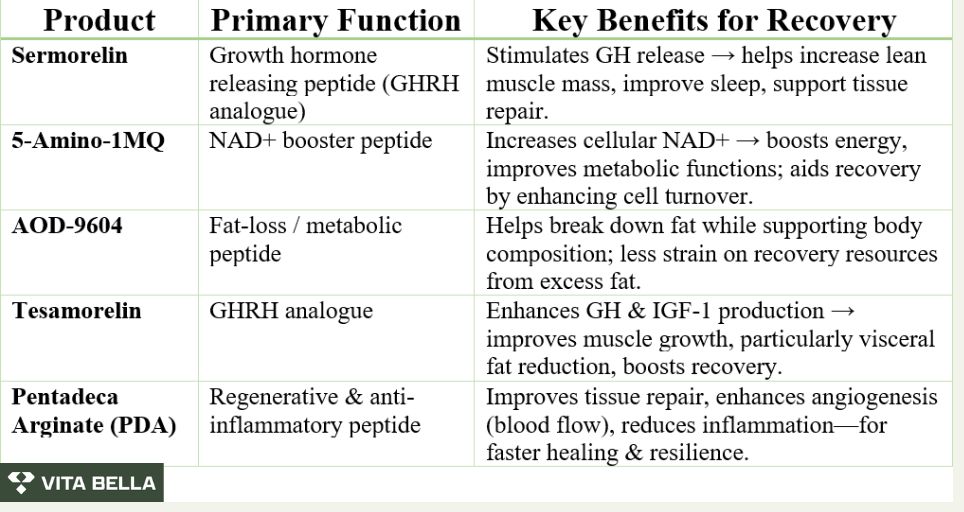What if recovery didn’t mean weeks on the sidelines but just days? That’s exactly the promise scientists are exploring with peptides1. These short chains of amino acids are attracting attention for their potential to accelerate recovery and enhance performance, helping both recreational and elite athletes get back in action faster. They are transforming sports medicine by speeding up tissue repair, reducing inflammation, and helping athletes bounce back faster.
Studies 2 highlights agents like BPC-157 for their potential to boost healing and endurance, though more clinical trials are needed. Additionally, peptide therapies have shown promise in metabolic and regenerative pathways 3 that support faster adaptation to training stress.
Your body deserves more than rest; it deserves science-driven recovery. Vita Bella’s peptide-based supplements fuel healing, improve endurance, and support long-term performance. Reclaim your strength naturally.
What are Peptides and How Do They Work?
Peptides are short chains of amino acids that act as messengers in the body 4, signaling cells to repair, restore, and regenerate tissues. Their targeted signaling plays a key role in recovery and performance by influencing muscle growth, energy metabolism, and hormonal pathways.
1- Muscle growth & repair
Peptides like growth hormone–releasing peptides (GHRPs) and IGF-1 related compounds stimulate protein synthesis and satellite cell activation, which are crucial for muscle hypertrophy and repair after intense training. They not only help fix microtears but also reduce muscle protein breakdown 1, leading to faster strength recovery and lean muscle preservation.
2- Tissue healing
Collagen-boosting and regenerative peptides can accelerate healing 5 in ligaments, tendons, and cartilage, which often have poor natural blood supply. Studies in orthopedic recovery show significant improvements in tendon repair and reduced inflammation, making certain peptides valuable for both sports injuries and chronic overuse conditions.
3- Energy & hormones
Certain peptides enhance mitochondrial efficiency, increasing ATP output and reducing oxidative stress during high-demand exercise. Others regulate endocrine signaling, stimulating growth hormone release 6 to improve recovery, fat metabolism, and endurance. This dual action supports both short-term performance and long-term metabolic balance.
4- Anti-inflammatory
Certain peptides show strong anti-inflammatory effects 7 by modulating immune responses and supporting tissue repair. For example, certain small peptides can decrease pro-inflammatory cytokines (such as TNF-α, IL-6) while increasing anti-inflammatory mediators like IL-10, which helps reduce both acute and chronic inflammation in injured tissues.
By enhancing repair and regeneration, certain peptides help athletes recover faster and maintain peak performance.
Why Recovery Matters for Every Athlete
Recovery is critical for athletes at all levels, whether a weekend warrior or an elite professional. Muscle breakdown and inflammation during exercise, the intensity and frequency differ, creating unique recovery needs that can be explained as follows.
Weekend warriors often face delayed onset muscle soreness 4 (DOMS) and slower recovery due to less consistent training habits.
Elite athletes undergo higher training volumes, making rapid repair essential to maintain performance 2 and prevent overuse injuries.
Muscle recovery 1 involves repairing microtears, reducing inflammation, and restoring energy stores, processes where certain peptides and targeted therapies show promise.
Effective recovery strategies help reduce downtime, optimize performance, and support long-term health.
Some Key Peptides for Recovery and Performance
BPC-157 (Body Protection Compound-157)
A synthetic peptide derived from gastric proteins, BPC-157 is known for its angiogenic and cytoprotective properties. It accelerates healing of muscles, tendons, ligaments, and even nerve injuries by stimulating new blood vessel formation and enhancing collagen synthesis.
Studies 8 suggest it also reduces inflammation, oxidative stress, and gut permeability, which indirectly supports whole-body recovery.
Growth Hormone Secretagogues (CJC-1295, Ipamorelin, GHRP-6)
These certain peptides mimic natural signals to stimulate pituitary release of growth hormone (GH). Elevated GH promotes protein synthesis, lipid metabolism, and muscle hypertrophy, while also aiding joint and cartilage repair 6.
They are particularly effective in enhancing sleep quality and cellular recovery cycles, both of which are critical for athletes who undergo intense training.
TB-500 (Thymosin Beta-4)
A naturally occurring peptide that regulates actin polymerization, essential for cell structure and mobility. TB-500 accelerates cell migration and angiogenesis, enabling rapid repair of muscle fibers, tendons, and even cardiac tissue.
It also improves flexibility of connective tissue 4, which reduces re-injury risk and supports long-term performance sustainability.
Together, these certain peptides support muscle repair, reduce downtime from injuries, and optimize performance, offering athletes a biological edge in recovery and resilience.
Don’t Just Rest, Recover Smarter
Too many athletes waste weeks sidelined by slow recovery. Vita Bella’s peptide-based supplements are designed to support faster healing, reduce inflammation, and keep you performing at your best.
By enhancing tissue repair, improving circulation, and balancing recovery hormones, these science-backed formulas help you bounce back stronger after every workout or injury. With Vita Bella, you don’t just recover you unlock your full performance potential.

FAQs
1. How do certain peptides help athletes recover faster?
Certain peptides accelerate tissue repair, reduce inflammation, and improve circulation, helping muscles, tendons, and ligaments heal more efficiently so athletes can get back to training sooner.
2. Are peptide-based supplements safe for long-term use?
When used as directed, peptide supplements are generally safe. Clinical studies highlight their role in supporting recovery, but professional guidance is recommended for personalized use.
3. Can certain peptides benefit both weekend warriors and elite athletes?
Yes. Whether you’re a casual exerciser dealing with soreness or a professional athlete facing intense training demands, certain peptides support faster recovery, better endurance, and long-term performance resilience.





















